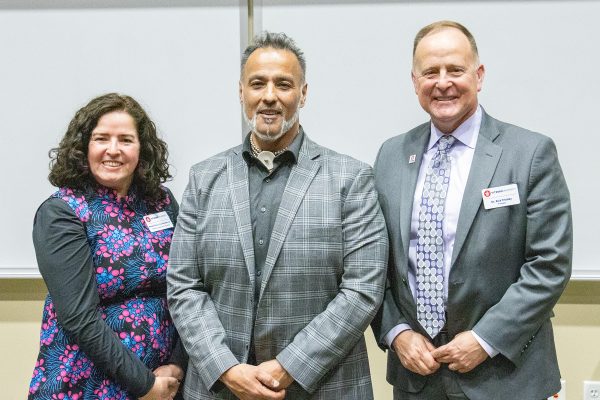Emotional Support Animals: Viterbo’s most adorable therapists
November 16, 2022
As the seasons change and the days become shorter, students may experience challenges related to mental health, including anxiety, depression and other challenges. Some may feel their lives would be improved with the addition of a furry counterpart to brighten their days. This is where an Emotional Support Animal (ESA) comes in.
Viterbo’s own Student Disability Policies and Procedures manual describes an ESA as “any animal with a primary role of providing emotional comfort to and for a person with a diagnosed disability.” It goes on to note that “support animals are not the same as service animals in that they are not individually trained to do work or perform tasks for the benefit of an individual with a disability.” The term “disability” includes diagnosed mental health conditions like major depressive disorders, anxiety disorders, ADHD, bipolar disorder and schizophrenia.
The process of obtaining an ESA starts with talking to a residence life staff member, like Joann Stacey, or Jane Eddy, the Academic Resource Center Director. Next, the student’s medical provider needs to complete the application form stating the student’s diagnosis and proving there is a need for the ESA. After that, the application will usually be assessed, and as long as all of the information meets the guidelines the student can bring their animal to campus.
“The guidelines for having an ESA are fairly liberal,” Eddy explains, “but without a diagnosis we don’t allow it.” Students should note that this diagnosis has to come from a medical professional outside of the university and cannot be a Viterbo counselor. Eddy acknowledges that counselors are “critical in the support of students maintaining good mental health,” but “if everyone that saw a counselor thought that equated with having an ESA, probably a very, very large percentage of our students would have an ESA.”
Approved ESAs need a clean bill of health from a veterinarian and a couple forms acknowledging damage liability to campus living spaces. While all on-campus housing accommodates ESAs, roommates may request to live without an animal. In this case, the student with the ESA may be asked to move.
However, “once you’re approved, you don’t need to be approved again,” says Eddy. Only roommate and housing contracts need to be resubmitted annually. According to Eddy, damages are rare when students opt for smaller, cleaner pets, including popular animals like cats, rabbits, guinea pigs, hedgehogs and dogs.
Patricia Rivera Torres says of her ESA, “It’s like having a best friend to come home to every day who’s excited to see you.” Rivera Torres’ ESA is a two-and-a-half-year-old tabby cat named Guthrie. Even though she’s only had him for a year, Rivera Torres says she “can’t remember having a life without Guthrie around.” She says, “he makes my day so much better, and I miss him when I go to class.”
The deep emotional connection and support these animals provide is recognized by Eddy, who says, “this helps students, and we want students to be healthy.” She continues to say, “We know right now we live in a society that is seeing a huge increase in mental health challenges.” This sentiment is especially true among college students.
According to a Fortune survey conducted by The Harris Poll in June of 2022, 60% of college students have been diagnosed with a mental health condition. The highest-ranking condition is anxiety with 43% of students diagnosed, followed by depression (33%) and trauma/stressor related disorders (12%).
Rivera Torres warns that “people might discount your need for emotional support with an animal. It’s often considered just a pet that you have, but it also gives a great deal of therapeutic support.” Although Eddy doesn’t have an official ESA of her own, she also understands the support these animals can bring. “I have five children that I raised,” she says. “I have a husband, and nobody has ever loved me as much as the dogs do. Nobody jumps up and down when I come in the door. It’s that unconditional love and acceptance. And so, if that’s going to make students feel better, we don’t want to stand in the way of that.”
If you’d like to start the process of getting an ESA, talk to your medical provider and set up a meeting with a Residence Life staff member.









